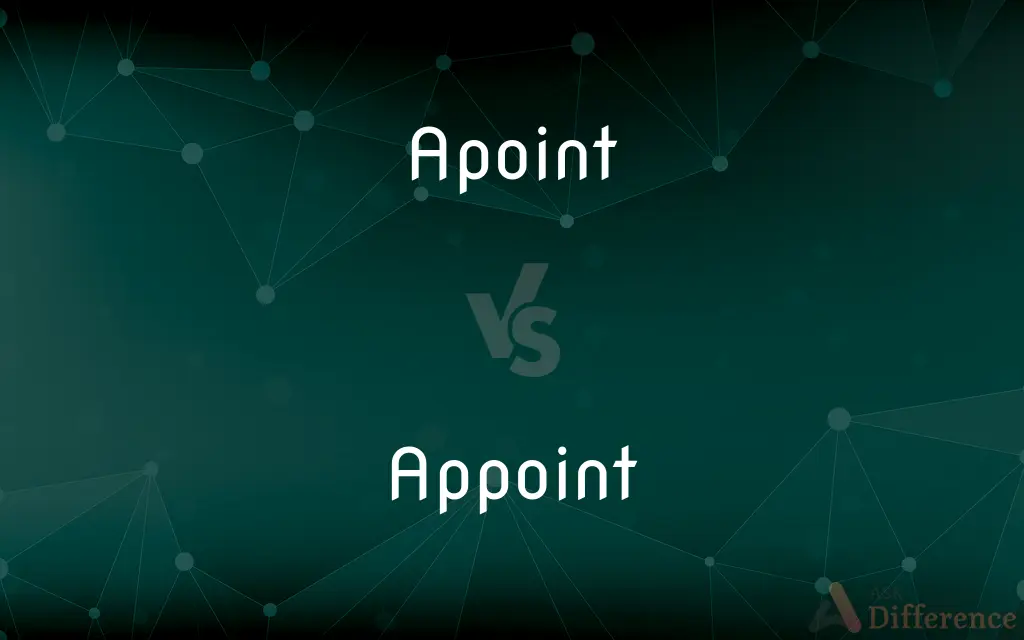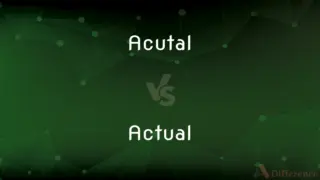Apoint vs. Appoint — Which is Correct Spelling?
Edited by Tayyaba Rehman — By Fiza Rafique — Updated on March 29, 2024
"Apoint" is a misspelling. The correct spelling is "Appoint," which means to designate or assign someone to a particular position or role.

Table of Contents
Which is correct: Apoint or Appoint
How to spell Appoint?

Apoint
Incorrect Spelling

Appoint
Correct Spelling
ADVERTISEMENT
Key Differences
Relate "Appoint" to "Point"; both have "point" but "Appoint" starts with an "A."
Use mnemonics: "All People Prefer Others In Nice Ties" as a way to remember "Appoint."
Recall the prefix "ap-" and add another "p" to form "appoint."
Think of "appointment" to remember the double "p" in "appoint."
Think of "appoint" as "a point" where someone gets designated to a role.
ADVERTISEMENT
How Do You Spell Appoint Correctly?
Incorrect: They plan to apoint a committee to investigate the issue.
Correct: They plan to appoint a committee to investigate the issue.
Incorrect: The manager decided to apoint a new team leader.
Correct: The manager decided to appoint a new team leader.
Incorrect: We need to apoint someone to organize the event.
Correct: We need to appoint someone to organize the event.
Incorrect: He was disapointed when they didn't apoint him.
Correct: He was disappointed when they didn't appoint him.
Appoint Definitions
To direct or command with authority.
He appointed them to complete the task.
To establish by legal or authoritative act.
She was appointed guardian of the child.
To name or assign to a position, duty, or office.
They will appoint her as the new CEO.
To select or designate to fill an office or a position
Appointed her the chief operating officer of the company.
To fix or set by authority or by mutual agreement
Will appoint a date for the examination.
To furnish; equip
A house that is comfortably appointed.
(Law) To direct the disposition of (property) to a person or persons in exercise of a power granted for this purpose by a preceding deed.
(transitive) To set, fix or determine (a time or place for something such as a meeting, or the meeting itself) by authority or agreement.
(transitive) To name (someone to a post or role).
(transitive) To furnish or equip (a place) completely; to provide with all the equipment or furnishings necessary; to fit out.
(transitive) To equip (someone) with (something); to assign (someone) authoritatively (some equipment).
To fix the disposition of (property) by designating someone to take use of (it).
To fix with power or firmness by decree or command; to ordain or establish.
To resolve; to determine; to ordain.
To fix with power or firmness; to establish; to mark out.
When he appointed the foundations of the earth.
To fix by a decree, order, command, resolve, decision, or mutual agreement; to constitute; to ordain; to prescribe; to fix the time and place of.
Thy servants are ready to do whatsoever my lord the king shall appoint.
He hath appointed a day, in the which he will judge the world in righteousness.
Say that the emperor request a parley . . . and appoint the meeting.
To assign, designate, or set apart by authority.
Aaron and his shall go in, and appoint them every one to his service.
These were cities appointed for all the children of Israel, and for the stranger that sojourneth among them.
To furnish in all points; to provide with everything necessary by way of equipment; to equip; to fit out.
The English, being well appointed, did so entertain them that their ships departed terribly torn.
To point at by way, or for the purpose, of censure or commendation; to arraign.
Appoint not heavenly disposition.
To direct, designate, or limit; to make or direct a new disposition of, by virtue of a power contained in a conveyance; - said of an estate already conveyed.
To ordain; to determine; to arrange.
For the Lord had appointed to defeat the good counsel of Ahithophel.
Create and charge with a task or function;
Nominate a committee
Assign a duty, responsibility or obligation to;
He was appointed deputy manager
She was charged with supervising the creation of a concordance
Furnish;
A beautifully appointed house
To determine or decide upon something beforehand.
The date for the meeting was appointed two weeks ago.
To equip or supply with necessary items.
The room was appointed with luxurious furnishings.
Appoint Meaning in a Sentence
The president will appoint a new ambassador to France next month.
To fill the vacancy, the mayor will appoint a new council member.
After much deliberation, they decided to appoint a mediator for the negotiations.
For the upcoming project, we need to appoint a leader with strong organizational skills.
For efficient management, they appoint a different member to chair the meeting each time.
The committee will appoint a liaison to communicate with other organizations.
To streamline the process, they appoint a coordinator for each department.
Parents appoint a day each week to discuss their child's progress at school.
Common Curiosities
What is the pronunciation of Appoint?
It's pronounced as /əˈpɔɪnt/.
Which vowel is used before Appoint?
Context determines the vowel, but often "to" as in "to appoint."
Which preposition is used with Appoint?
"As" is often used, as in "appoint someone as a manager."
Why is it called Appoint?
It's derived from the Latin "appunctuare" meaning "to bring to the point," signifying designating or assigning.
What is the root word of Appoint?
The root word is "point" with the prefix "ap-."
Which conjunction is used with Appoint?
There's no specific conjunction exclusive to "appoint."
Which article is used with Appoint?
"An" can be used, as in "an appointed time."
Is Appoint an adverb?
No, "appoint" is not an adverb.
Is Appoint a negative or positive word?
"Appoint" is neutral, neither negative nor positive.
What is the verb form of Appoint?
"Appoint" is already in its verb form.
What is the plural form of Appoint?
Verbs don't have plural forms.
Is Appoint a noun or adjective?
"Appoint" is a verb.
Is the word Appoint is imperative?
It can be used in the imperative mood, as in "Appoint a leader!"
Is the word “Appoint” a Direct object or an Indirect object?
"Appoint" is a verb; its object can be direct, e.g., "Appoint (direct object: a manager)."
What is the singular form of Appoint?
"Appoint" is a verb and doesn't have a singular or plural form.
Is Appoint a countable noun?
"Appoint" is a verb, not a noun.
Is the word Appoint is Gerund?
No, but "appointing" is its gerund form.
What is a stressed syllable in Appoint?
The second syllable, "point," is stressed.
What is the opposite of Appoint?
Dismiss or discharge.
What is the first form of Appoint?
The base form is "appoint."
Is Appoint an abstract noun?
No, "appoint" is a verb.
Is Appoint a vowel or consonant?
"Appoint" is a word containing both vowels and consonants.
Is the Appoint term a metaphor?
Not inherently, but it can be used metaphorically in some contexts.
How many syllables are in Appoint?
There are two syllables in "appoint."
How do we divide Appoint into syllables?
It can be divided as Ap-point.
Which determiner is used with Appoint?
"The" can be used, as in "the appointed day."
What is the second form of Appoint?
"Appointed" is the past tense.
What is the third form of Appoint?
"Appointed" is the past participle form.
How is Appoint used in a sentence?
"The board will appoint a new director next week."
Is Appoint a collective noun?
No, "appoint" is not a collective noun.
What part of speech is Appoint?
"Appoint" is a verb.
What is another term for Appoint?
Nominate, designate, assign.
Share Your Discovery

Previous Comparison
Acutal vs. Actual
Next Comparison
Heavey vs. HeavyAuthor Spotlight
Written by
Fiza RafiqueFiza Rafique is a skilled content writer at AskDifference.com, where she meticulously refines and enhances written pieces. Drawing from her vast editorial expertise, Fiza ensures clarity, accuracy, and precision in every article. Passionate about language, she continually seeks to elevate the quality of content for readers worldwide.
Edited by
Tayyaba RehmanTayyaba Rehman is a distinguished writer, currently serving as a primary contributor to askdifference.com. As a researcher in semantics and etymology, Tayyaba's passion for the complexity of languages and their distinctions has found a perfect home on the platform. Tayyaba delves into the intricacies of language, distinguishing between commonly confused words and phrases, thereby providing clarity for readers worldwide.


































